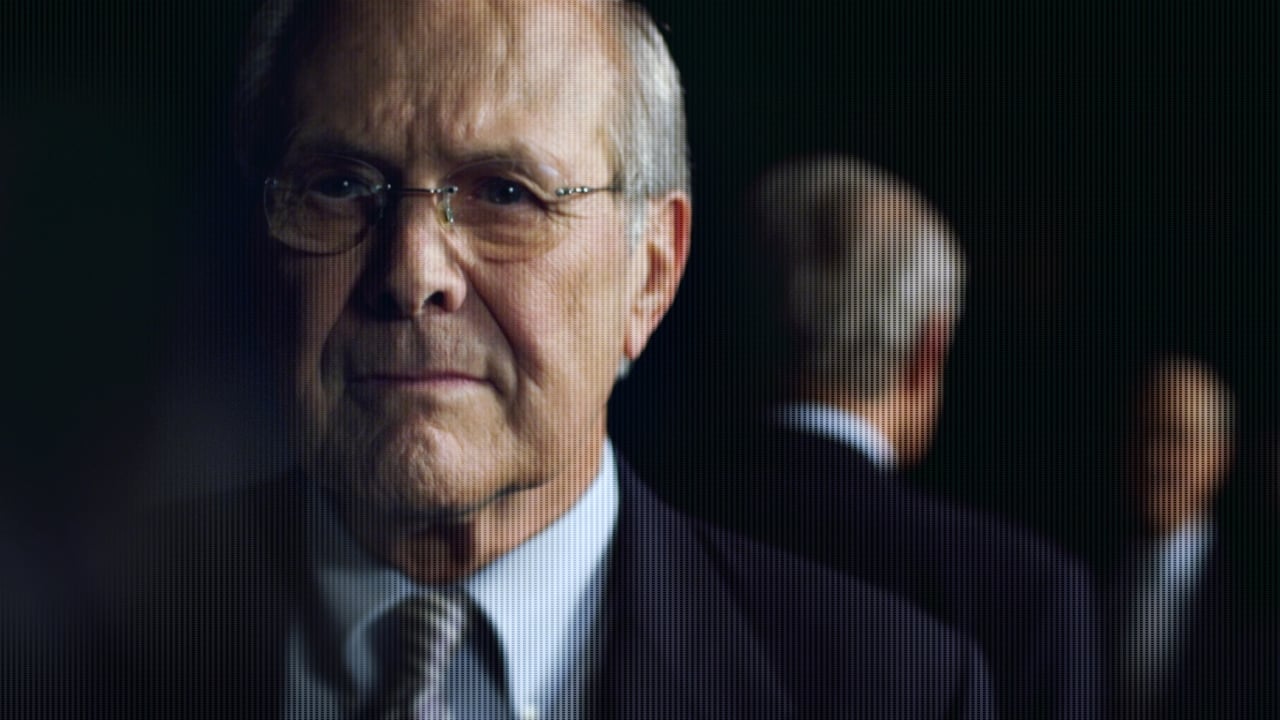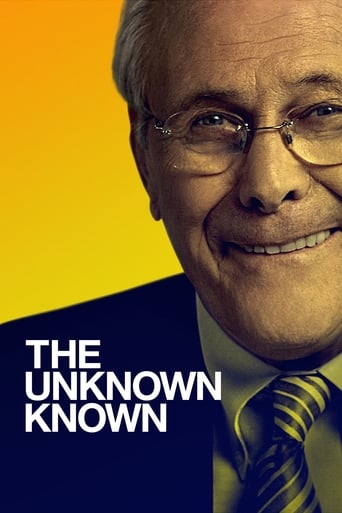NekoHomey
Purely Joyful Movie!
Dorathen
Better Late Then Never
Kodie Bird
True to its essence, the characters remain on the same line and manage to entertain the viewer, each highlighting their own distinctive qualities or touches.
Neive Bellamy
Excellent and certainly provocative... If nothing else, the film is a real conversation starter.
classicalsteve
There's something maddeningly chaotic about Donald Rumsfeld's logic in terms of US international policy. When he was in press conferences during the Iraq War under W Bush, Rumsfeld's answers to tough questions often rang of the so-called "double-speak", a term which is associated with but not explicitly used in George Orwell's "1984". He would respond with other questions or make unfunny jokes. He would use strange metaphors. Rarely did he simply answer direct questions. Errol Morris' documentary about Rumsfeld is strangely similar. He has Rumsfeld do most of the talking, and what comes out of the former Defense Secretary's mouth is a barrage of inconsistencies, untruths, and illogical conclusions. In short, Rumsfeld's whole way of thinking is a jumbled incomprehensible mess. And yet, he was one of the most powerful people in the W Bush administration during the first decade of the 21st century. You could argue W Bush had flawed judgment, Dick Cheney was immoral, but Rumsfeld is in his own realm. As Morris said in an interview, he was one of the most "self-deceiving" people he had ever interviewed.The format of the documentary is one of the strangest you'll ever see in a film of this type. The subject himself is the narrator. He narrates and then comments on the different subjects covered in the documentary. He occasionally answers questions posed by Errol Morris who can be heard in the background. One of the former Defense Secretary's most interesting phrases is "the absence of evidence is not evidence of absence", a phrase coined by Carl Sagan when referring to the unknown realms of outer space. Rumsfeld is famous for composing 1000's of email memos, and recurring throughout the memos are his definitions of particular words and terms which are displayed on-screen. The film traces his childhood, his early years in politics under President Nixon and briefly under Gerald Ford. He was an adviser for Governor Reagan and later for President Reagan and George Bush Senior. Most of the documentary concerns the Iraq War and his tenure as Defense Secretary under George W Bush.One example which highlights Rumsfeld own self-deception and denial is when Morris asks about the public perception concerning Saddam Hussein after the 9/11 attacks. Rumsfeld in the documentary claims people knew that Hussein and Iraq had nothing to do with 9/11. The documentary then cuts to a Rumsfeld press conference clip of 2003 in which a reporter quotes Saddam Hussein: "I would like to tell you directly we have no relationship with Al Queada." Rumsfeld's reply: "And Abraham Lincoln was short." The reporter than asks Rumsfeld to respond to Hussein's statement and the Secretary of Defense simply says that Hussein "rarely tells the truth". The implication is clear: Rumsfeld wants the public to believe that Hussein and Iraq contributed to 9/11. If you read between the lines, and realize what is unsaid rather than said, Rumsfeld never actually states that Hussein is lying about having a relationship with Al-Queada. He makes the Lincoln analogy joke and he says that Hussein has a pattern of lying, but never once did Rumsfeld himself directly accuse Hussein of lying about having a relationship Al-Quaeda. This is the kind of double-talk, doublespeak which is how Rumsfeld's reasoning seems to work.People have criticized the documentary as raising many more questions than it answers. This may be the point of the film. Rumsfeld comes off, at best, as a completely self-deceived person whose rationalities have no logic, and at worst an amoral international leader who got us into an unjust war. His logic, we "lacked imagination" to see the Japanese coming when they attacked Pearl Harbor and thereby justifies the War in Iraq. As Morris points out in an interview, if we can imagine our enemies doing anything in the future, then we can rationalize military operations for almost any reason at any time.
Noah Stobor
This documentary was just as gratuitous and ridiculous as our government. Morris thought he was smart and clever with this documentary but really answered no questions and made himself look as silly and absent as any politician. His tactics were narcissistic and self righteous and he fits right in with any ambitious capitalist trying to "up" someone, making him seem more intelligent, when he really showed he is lacking in film making and story telling. All Morris did was show commonalities with himself and Rumsfeld. If he wants to create a documentary, maybe he should take interviewing classes instead of trying to massage his own ego.
MisterWhiplash
They say 'never forget 9/11'. Of course. I say never forget Rumsfeld, a man who at times seems fairly intelligent (cue up George Carlin's quick follow-up - "AH, he's FULL OF (bleep)!") and other times answers Errol Morris' questions in such a way where Morris just leaves the camera on him for a while afterward. There's almost that sensation looking at him like 'you stare at the abyss...' And yet, he did offer up his resignation at the time of the Abu-Gharib scandal, which seems for me to be a new revelation - and by the way, this is as much if not more-so a follow-up to Morris' Standard Operating Procedure as it is the Fog of War, the story of the soldiers there doing the torture and the pictures, this time it's the "Captain" - though how genuine this was, and of course how awfully it makes Bush look for not accepting it, is up for debate. There are a lot of shots of the ocean here, at one point an 'ocean of words' even. I feel like this is a superb metaphor for the film and this figure - what do we see when we look at it? Why does it look so calm? Morris never shows an ocean in a stormy mode; just the very calm surface, at one point split right down the middle. But there's so much going on underneath it. Plus aerial shots of the swamps as well.Morris' direction is impeccable as always, a fantastic, spot-on mix of news footage, many clips from Rumsfeld press conferences like when he first posited the 'known known etc' bit, as if he were giving out a portion of a script for a Jean-Luc Godard movie or some semantic babble (maybe poignant, but still babble). It almost has the effect, if only here and there, of the 'point-counter-point' method used on The Daily Show, showing him saying one thing here, another thing later. This isn't played for laughs, though, unless they are of the most highly uncomfortable, awkward, almost horror-movie variety.This is someone looking head-on, and Morris has always been the great detective of documentary directors, seeing how the facts pile up. But even here, what's remarkable, is that Morris puts his voice more than I've seen him do in past films. And at one point in reaction to Rumsfeld saying he never read documents pertaining to a particularly egregious act of abuse on detainees, he says in incredulity "REALLY?" This film is a burning reminder what a slippery character Rumsfeld was and is. He also had a knack for being efficient back in the Ford and Regan era as an envoy - of course they make light of his meeting with Sadaam in 1983, but more telling is how much Rumsfeld wanted to meet with and did spend hours with one of his 2nd in command and, it's almost the sense, he kind of identified with him - but really his time in Bush Jr's Sec post was where he made his name for better and worse...Actually, who really "knows" if it's for better, given with everything that he oversaw and approved of - or didn't approve but we can't really know what was approved or not approved (and then one gets into the "more you look the less you know" facet of things, which in this film and filmmaker carries as a an intense underlying ideology, but I digress sort of). It's fascinating to watch him and hear him talk, as much as it is almost creepy every time he gives his s***-eating grin. Not just the smile but the eyes as well.What is he thinking when he says these things, responding to Morris as he did in his press conferences with questions that he answers himself? Morris uses a visual approach of dictionary terms at many points, as well as Rumsfeld's countless memos, and I got a sense of a man who was very much aware of what he was doing. And, at the end of it all, when Morris asks point blank "Why are you doing this, talking to me?" with "That's a vicious question... I guess you'll never know" I have to wonder if he does, or really doesn't.The Unknown Known. I never have quite forgotten Rumsfeld over the years since he left his office in 2006, but this film brought back a flesh flood of memories along with that face and old but very much KNOWING eyes. At the end of the day, he is not a stupid man, or at least believes he isn't, has his own rigorous set of logic and follows it. That it also led it into two wars, one still going on, and so so so so many lives lost.... damn.
cchardon-923-319604
Donald Rumsfeld and Errol Morris are two senior men, not lacking success and self-esteem, Errol offering an audience and to Donald, to re-write his Historie.What usually interests the film-maker is how people try so hard not to see the truth. Interesting angle. The movie was born from the numerous memos from Donald Rumsfeld, also a good Start! The movie has a high quality production and the effects are great, the soundtrack is pervasive … that is where all begins. It is produced like a Hollywood movie and formally gives the impressions of deepness. As spectator, it is embarrassing to see this long PR-Advertisement. Rumsfeld knows how to behave in front of a camera. He knows how to confuse, using pseudo-philosophical generalizations like The "unknown known". Unfortunately, the story-telling is full of inaccuracies and lies. The spectator is left alone, without anybody to counters or explains the infatuations of this guy.Irak had been invaded because the FBI was delivering wrong information? I invite you to watch the movie "Fair Game" instead of "the Unknown Known"… Rumsfeld pronounces the name of Dick Cheney, I would have wished his view about the privatization of the war through companies like Halliburton and Blackwater.I wish I would have not seen this propaganda-movie. The only thing I learnt is to avoid the next movies from Errol Morris.

